
11 Things We Learned at the Voiles
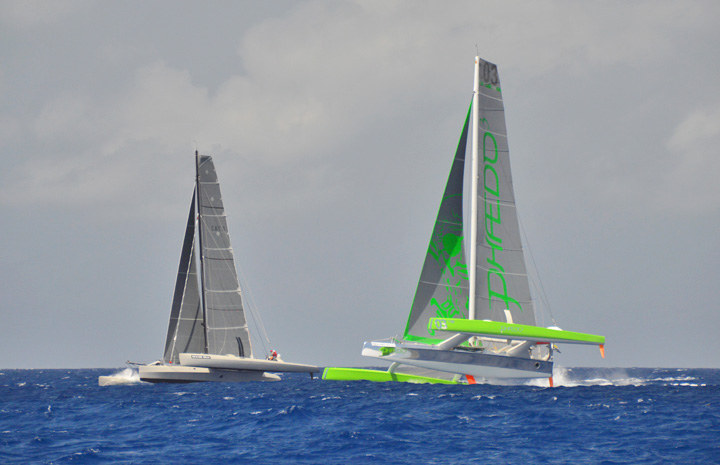
©2015Latitude 38 Media, LLC
With a record 70 boats on the course, the six-year-old Voiles de St. Barth is getting more popular all the time. This despite the fact that the emphasis is on the quality of boats, not the quantity. The Voiles, for example, is not an event open to Moorings or Sunsail bareboats. Now, for the lessons learned:
1) That Phaedo3, a $5 million MOD70 with a crew of six, cleans the clock of Comanche, a $25 million, 100-ft monohull with maybe 30 crew, every time. And it wasn’t even close, as Lloyd Thornburg’s (Santa Fe, Newport Beach) Phaedo3, under the watchful eye of Brian Thompson, simply walked away from Jim Clark’s (Northern California) magnificent red and black monster. In the 42-mile race around Tintamarre Island, the tri was about 30% faster. And it didn’t make much difference if it was blowing 14 knots or 20 knots. After all, how does a monohull keep up with a trimaran sailing to windward at 30 knots in 17 knots of wind?
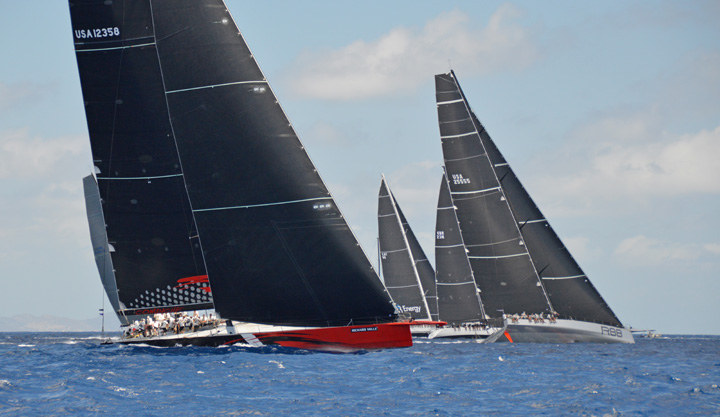
©2015Latitude 38 Media, LLC
2) That Clark’s Comanche, with North Sails president Ken Read at the wheel, could beat George David’s brand new Juan K Rambler 88, which must have cost $20 million, boat-for-boat in every race. But that Rambler could easily correct out on Comanche in each race. Comanche’s Clark and Read said they didn’t care about corrected time. In fact, they professed to not even know the boat’s rating.
3) That the revolutionary 40-ft Gunboat G4 foiling ‘coastal cruiser’ Timbalero III often wasn’t that fast upwind compared to the Gunboat 66, but was very fast downwind — when she could foil and stay right side up. Alas, in the fourth race she seemed on the verge of being out of control several times, and finally went over. Fortunately, nobody was hurt, and a boat with two 250-hp outboards was able to pull her upright without destroying the mast. But a ‘foiling coastal cruiser’? Look at the video below and decide for yourself.
Wipe Out from Gunboat on Vimeo. The right-out-of-the-box 40-ft Gunboat G4, the so-called foiling cruising boat, had some good legs and some bad legs. The worst leg was during the last race when she flipped. Check out this video courtesy of the Gunboat website. Gunboat’s Peter Johnstone and members of the crew told us they are unfazed and ready to sail again as soon as the main is fixed. They’ll get their chance at Antigua Sailing Week.
4) That half the boats in Maxi 2 were from California. They included Silicon Valley’s Wendy Schmidt, philanthropist and wife of Google Executive Chairman Eric Schmidt, who normally wins this division with her impeccable Swan 80 Selene. Alas, Selene had a DNF followed by three bullets, which was only good enough for second. Third place honors in Maxi 2 went to Newport Beach’s Jim Madden and his Swan 601 Stark Raving Mad. Like Schmidt, Madden is a Voiles regular.
Fifth out of six boats in Maxi 2 was Tom Siebel, yet another Northern California tech success story, with his Swan 90 Odin. Unlike a lot of boatowners, Siebel drove all the time, even during the 42-mile race. In fact, Odin established the Maxi 2 reference time for the ‘Tintamarre Speed Run’. After a hard week of racing and partying, Hogan Beattie and some of the other crew had to rush to St. Martin immediately following the last race and hop on Siebel’s jet back to Northern California. Why? To deliver his MOD70 Orion down the coast to Newport Beach for the start of this weekend’s Ensenada Race. Meanwhile Odin would take off for the Med to get ready for racing there. It should be noted that Siebel is a renowned philanthropist.
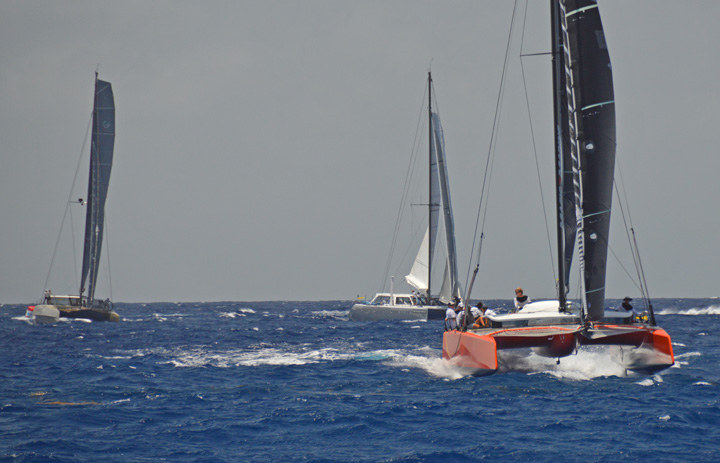
©2015Latitude 38 Media, LLC
5) That Jim Swartz’s Utah-based TP 52 Vesper was again unbeatable, winning all four races. Driven by Gavin Brady, she’s managed by Ken Keefe of KKMI in Sausalito. (Keefe’s longtime sidekick Paul Cayard was also on the island, but on vacation, and didn’t even sail.)
6) That even excellent sailors have bad days. We’re talking about Greg Slyngstad of Seattle, a vet of last year’s event, who was right in there for contention until the start of the last race with his much-loved J/125 Hamachi. During a 25-boat starting sequence, Slyngstad got trapped while on port, and his boat was holed badly on the starboard side. He immediately admitted fault to the owner of the starboard boat, who warmly accepted his apology and insurance info.
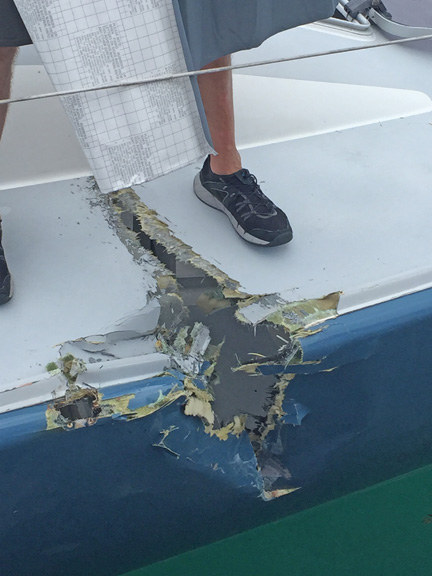
©Latitude 38 Media, LLC
7) That Rick Wesslund (honorary Northern Californian as a result of living in Tiburon and being a member of the San Francisco YC until 2007) of the Florida-based J-122 El Ocaso doesn’t like parades. "I can’t understand why they don’t have windward-leeward courses instead of these reaching parades," he told Latitude. "If they had windward-leewards, we’d be the best boat out there." Dave Hampton, one of his San Francisco crew, thought exactly the same thing. When we raised the complaint with Ken Read of Comanche, he said, "You can do windward-leewards anywhere. It would be blasphemy to have those kinds of races in such a beautiful place as this, which has so many little islands and rocks."
(Kudos to Hampton, who traded his first class cross-country seat to de Mallorca so he could sit next to his girlfriend on the way to St. Barth.)
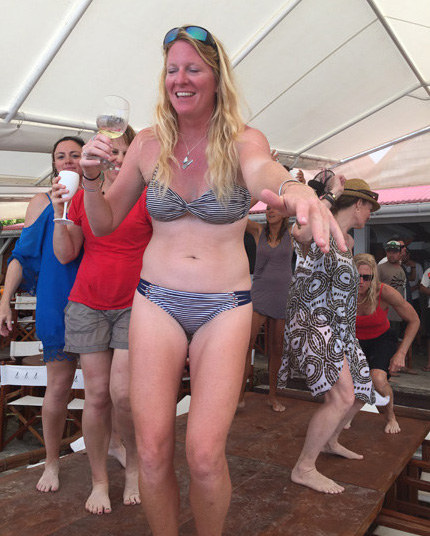
©Latitude 38 Media, LLC
8) That San Francisco’s Peter Aschenbrenner is hard core with his Iren’s 63 ‘cruising trimaran’ Paradox. This was his third and fastest Voiles. "Last summer we had new curved foils installed while we were in Brittany," he told Latitude. "This keeps the leeward hull from being pressed down as far, and we’re 15 to 20% faster." Paradox took second in class and twice beat Comanche boat-for-boat.
Aschenbrenner will be doing the TransAtlantic Race, the Fastnet Race and the Middle Sea Race. So will Thornburg and Phaedo3. So will Comanche. So will Rambler88.
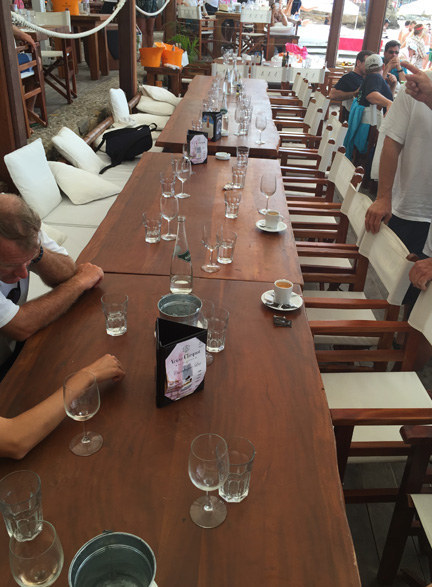
©2015Latitude 38 Media, LLC
9) That former Northern Californians Bob and Kristen Beltrano know how to finish strong with their Swan 53 Nai’a, even if she has a centerboard. They won the last race to take third in class. Their crew bunked aboard our old friend Greg Dorland and Debbie Macrorie’s Catana 52 Escapade.
10) That the Gunboat showdown was really interesting, as the company had a G4, hull #2 of the new 55s, and an older 62. Our opinion? The G4 Timbalero III is a real stretch for a ‘cruising’ boat, and couldn’t keep up with the 62 Elvis going to weather. But she was much faster — and dramatically smaller — off the wind. Sailing side-by-side upwind in 16 knots, the 62 pitched much less than the 55. She was clearly the luxury liner of the group.
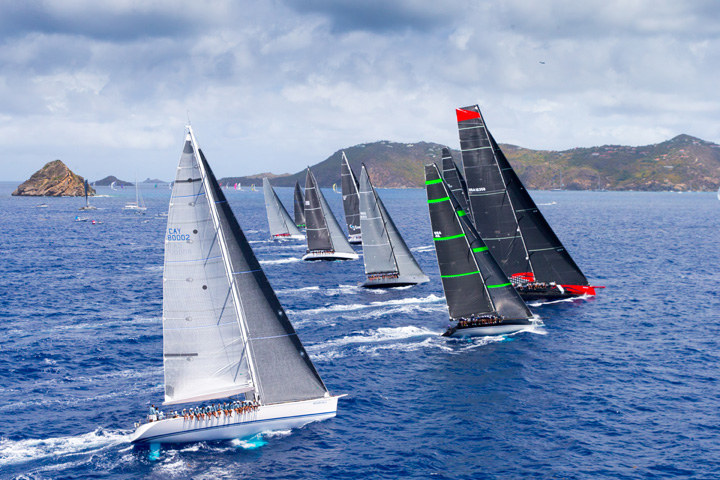
©2015Latitude 38 Media, LLC
11) That St. Barth is one hell of a place for a regatta, and that the Voiles organizers know how to put on a first-class event. As Sergio Sagramoso of the Puerto Rico-based Melges 32 Lazy Dog, winner of all four races, repeatedly said on the podium, "This is the best regatta in the Caribbean. This is the best regatta in the Caribbean. This is the best regatta in the Caribbean." Great racing, great partying, and great ambience.
PHOTO
How can you participate in the Voiles if you’re not a multimillionaire? There are several ways. First, you could charter a Melges 24 — or sub 40-ft racing boat. Second, you could charter a regular charter boat in St. Martin and come 15 miles to St. Barth to try to get a crew position or third, just rent a charter boat to watch the racing. You’ve never seen anything like the tacking duel between Comanche and Rambler 88, or Phaedo going by at 30 knots. And once the fleet has gone by, you head to Columbie for an hour of R&R on the hook before catching the last windward leg. There are parties on the dock, at Nikki Beach and at night at Shell Beach. Everybody is welcome.
Then again, if you happen to be a woman who sails, or even just a woman, the Voiles is pretty much your oyster.

Boat on left is Selene. Odin is down the line with black sails with graphics